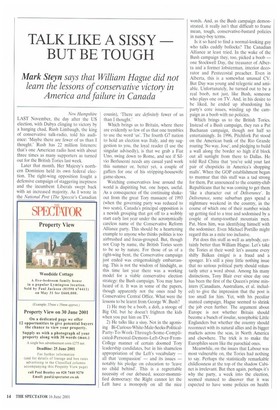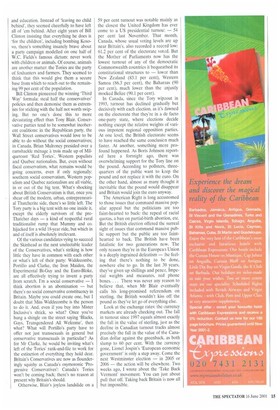TALK LIKE A SISSY BUT BE TOUGH
Mark Steyn says that William Hague did not
learn the lessons of conservative victory in America and failure in Canada
New Hampshire LAST November, the day after the US election, with Dubya clinging to victory by a hanging chad, Rush Limbaugh, the king of conservative talk-radio, told his audience: 'Maybe there are fewer of us than I thought.' Rush has 22 million listeners: that's one American radio host with about three times as many supporters as turned out for the British Tories last week.
Later that month. Her Majesty's northern Dominion held its own federal election. The right-wing opposition fought a defensive campaign of staggering ineptness and the incumbent Liberals swept back with an increased majority. As I wrote in the National Post (The Speccie's Canadian cousin), 'There are definitely fewer of us than I thought.'
Which brings us to Britain, where there are evidently so few of us that one trembles to use the word `us'. The fourth 07 nation to hold an election was Italy, and my suggestion to you, the loyal reader (I use the singular advisedly), is that we grab a Fiat Uno, swing down to Rome, and see if Silvio Berlusconi needs any casual yard work this summer or, better yet, a couple of gaffers for one of his stripping-housewife game-shows.
Watching conservatives lose around the world is dispiriting but, one hopes, useful. As a consequence of the continuing shakeout from the great Tory massacre of 1993 (when the governing party was reduced to two seats), Canada's principal opposition is a newish grouping that got off to a wobbly start early last year under the acronymically careless name of the Conservative Reform Alliance party. This should be a heartening example to anyone who thinks politics is too airbrushed and focus-grouped. But, though not Crap by name, the British Tories seem to be so by nature. For those of us of a right-wing bent, the Conservative campaign just ended was cringemakingly embarrassing. This is not the wisdom of hindsight, as this time last year there was a working model for a viable conservative election strategy: the Bush campaign. You may have heard of it. It was in some of the papers, though apparently not the ones read by Conservative Central Office. What were the lessons to be learnt from George W. Bush?
1) He may be a boob, a dolt, a stooge of Big Oil, but he doesn't frighten the kids when you put him on TV.
2) He talks like a sissy. Not in the agonising Bi-Curious-White-Male-Seeks-PoliticalParty-To-Work-Through-Some-Complicate d-Person al-D emons-LeftOver-FromCollege manner of certain doomed Tory leadership candidates, but in his shameless appropriation of the Left's vocabulary — all that 'compassion' — and its issues — notably his pledge on education to 'leave no child behind'. This is a regrettable necessity of our debased, soccer-mommifled democracy: the Right cannot let the Left have a monopoly on all the nice words. And, as the Bush campaign demonstrated, it really isn't that difficult to frame mean, tough, conservative-bastard policies in nancy-boy terms.
Is it so hard to find a normal-looking guy who talks cuddly bollocks? The Canadian Alliance at least tried. In the wake of the Bush campaign they, too, picked a boob — one Stockwell Day, the treasurer of Alberta and a former lobsterman, interior decorator and Pentecostal preacher. Even in Alberta, this is a somewhat unusual CV. But Day was young and telegenic and amiable. Unfortunately, he turned out to be a real boob, not just, like Bush, someone who plays one on TV. And, in his desire to be liked, he ended up abandoning his party's core issues, winding up the campaign as a boob with no policies.
Which brings us to the British Tories. Instead of a Bush campaign, they ran a Pat Buchanan campaign, though not half so entertainingly. In 1996, Pitchfork Pat stood on the American bank of the Rio Grande roaring 'No way, Jose', and pledging to build a wall along the border so high it'd block out all sunlight from there to Dallas. He told Red China that 'you've sold your last pair of chopsticks in America's shopping malls'. When the GOP establishment began to murmur that this stuff was a tad strong for them, Pat announced to the country-club Republicans that he was coming to get them 'like a character out of Deliverance'. In Deliverance, some suburban guys spend a nightmare weekend in the country, in the course of which one of their number winds up getting tied to a tree and sodomised by a couple of stump-toothed mountain men. Pat, bless him, was identifying himself with the sodomiser. Even Michael Portillo might regard this as a mite too inclusive.
Pat does this stuff as well as anybody, certainly better than William Hague. Let's take the Tories at their word: let's assume every shifty Balkan émigré is a fraud and a sponger. It's still a pissy little nothing issue that no serious political party should voluntarily utter a word about. Among his many distinctions, Tony Blair ever since day one has been the first of the Queen's prime ministers (Canadians, Australians, et al. included) to give the impression that the post is too small for him. Yet, with his peculiar stunted campaign, Hague seemed to shrink the job even further. The argument about Europe is not whether Britain should become a bunch of insular, xenophobic Little Englanders but whether the country should reconnect with its natural allies and its bigger markets across the seas, in North America and elsewhere. The trick is to make the Europhiles seem like the parochial ones.
Meanwhile, on the issues that Labour was most vulnerable on, the Tories had nothing to say. Perhaps the statistically remarkable childlessness at the top of the shadow Cabinet is irrelevant. But then again, perhaps it's why the party, a week into the election, seemed stunned to discover that it was expected to have some policies on health and education. Instead of 'leaving no child behind', they seemed cheerfully to have left all of 'em behind. After eight years of Bill Clinton insisting that everything he does is 'for the children', including bombing Kosovo, there's something insanely brave about a party campaign modelled on one half of W.C. Fields's famous dictum: never work with children or animals. Of course, animals are another matter: the Tories are the party of foxhunters and farmers. They seemed to think that this would give them a secure base from which to reach out to the remaining 99 per cent of the population.
Bill Clinton pioneered the winning 'Third Way' formula: steal half the conservatives' policies and then demonise them as extremists for sticking with the half not worth swiping. But no one's done this to more devastating effect than Tony Blair. Conservative parties tend to be somewhat incoherent coalitions: in the Republican party, the Wall Street conservatives would love to be able to do without the social conservatives; in Canada, Brian Mulroney presided over a ramshackle ménage a trois made up of Milquetoast 'Red Tories', Western populists and Quebec nationalists. But, even without fiscal conservatism, what remains would be going concerns, even if only regionally: southern social conservatism, Western populism and Quebec nationalism are all viable, in or out of the big tent. What's shocking about British Conservatism is that, once you shear off the modern, urban, entrepreneurial Thatcherite side, there's so little left. The Tory party is a big tent with no one inside it, except the elderly survivors of the preThatcher days — a kind of respectful rural traditionalist rump that Mummy and co. hijacked for a wild 18-year ride, but which in and of itself is absolutely irrelevant.
Of the various candidates vying to succeed the Skinhead as the next unelectable leader of the Conservatives, what's striking is how little they have in common with each other or what's left of their party: Widdecombe, Portillo and Clarke, the Iron Maiden, the Experimental Bi-Guy and the Euro-Bloke, are all effectively trying to invent a party from scratch. I'm a social conservative — I think abortion is an abomination — but there's no social conservative constituency in Britain. Maybe you could create one, but I doubt that Miss Widdecombe is the person to do it. And, even if you buy into Mister Inclusive's shtick, so what? Once you've hung a shingle on the street saying 'Blacks, Gays, Transgendered All Welcome', then what? What will Portillo's party have to offer not just transsexuals in general but conservative transsexuals in particular? As for Mr Clarke, he would be inviting what's left of the Tories' rank-and-file to work for the extinction of everything they hold dear. Britain's Conservatives are now as flounderingly squishy as Canada's oxymoronie 'Progressive Conservatives': Canada's Tories won't be coming back; there's no reason at present why Britain's should.
Otherwise, Blair's joyless landslide on a
59 per cent turnout was notable mainly as the closest the United Kingdom has ever come to a US presidential turnou.: — 54 per cent last November. That month, Canada, whose usual voting levels are up near Britain's, also recorded a record low: 61.2 per cent of the electorate voted. But the Mother of Parliaments now has the lowest turnout of any of the democratic Commonwealth countries it bequeathed its constitutional structures to — lower than New Zealand (83.1 per cent), Western Samoa (86.3 per cent), the Bahamas (90 per cent), much lower than the unjustly mocked Belize (90.1 per cent).
In Canada, since the Tory wipeout in 1993, turnout has declined gradually but decisively with each election, as it's dawned on the electorate that they're in a de facto one-party state, where elections decide nothing except the relative weights of various impotent regional opposition parties. At one level, the British electorate seems to have reached the same conclusion much faster. At another, something more profound happened. As Boris Johnson reported here a fortnight ago, there was overwhelming support for the Tory line on the pound. According to pollsters, threequarters of the public want to keep the pound and not replace it with the euro. On the other hand, almost as many thought it inevitable that the pound would disappear and Britain would join the euro anyway.
The American Right is long accustomed to those issues that command massive popular appeal but the politicians are too faint-hearted to back: the repeal of racial quotas, a ban on partial-birth abortion, etc. But the British election offered the surreal sight of issues that command massive public support but the public are too fainthearted to back. The British have been fatalistic for two generations now. The only reason they're in the European Union is a deeply ingrained defeatism — the feeling that there's nothing to be done, nowhere else to go. In the last 30 years, they've given up shillings and pence, Imperial weights and measures, red phone boxes. . . . There was never any reason to believe that, when Mr Blair eventually calls his long-promised referendum on sterling, the British wouldn't kiss off the pound as they've let go of everything else.
Look at the exchange rates: the currency markets are already checking out. The fall in turnout since 1997 equals almost exactly the fall in the value of sterling, just as the decline in Canadian turnout tracks almost precisely the fall in the value of the Canadian dollar against the greenback, as both slump to 60 per cent. With the currency gone, Lionel Jospin's 'European economic government' is only a step away. Come the next Westminster election — in 2005 or 2006 — the action will be elsewhere. Two weeks ago, I wrote about the 'Take Back Vermont' movement. You can just about pull that off. Taking back Britain is now all but impossible.



































































 Previous page
Previous page